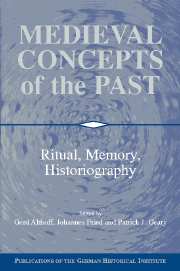Book contents
- Frontmatter
- Introduction
- 1 Authority and Legitimation of Royal Policy and Action: The Case of Henry II
- 2 King Henry II of Germany: Royal Self-Representation and Historical Memory
- 3 The Variability of Rituals in the Middle Ages
- 4 Rebels and Rituals: From Demonstrations of Enmity to Criminal Justice
- 5 Oblivion Between Orality and Textuality in the Tenth Century
- 6 Text and Ritual in Ninth-Century Political Culture: Rome, 864
- 7 The Concept of Time in the Historiography of the Eleventh and Twelfth Centuries
- 8 Constructing the Past by Means of the Present: Historiographical Foundations of Medieval Institutions, Dynasties, Peoples, and Communities
- 9 Topographies of Memory: Center and Periphery in High Medieval France
- 10 Challenging the Culture of Memoria: Dead Men, Oblivion, and the “Faithless Widow” in the Middle Ages
- 11 Artistic and Literary Representations of Family Consciousness
- 12 The Strange Pilgrimage of Odo of Deuil
- 13 The Rhineland Massacres of Jews in the First Crusade: Memories Medieval and Modern
- 14 The Martyr, the Tomb, and the Matron: Constructing the (Masculine) “Past” as a Female Power Base
- Index
7 - The Concept of Time in the Historiography of the Eleventh and Twelfth Centuries
Published online by Cambridge University Press: 05 January 2013
- Frontmatter
- Introduction
- 1 Authority and Legitimation of Royal Policy and Action: The Case of Henry II
- 2 King Henry II of Germany: Royal Self-Representation and Historical Memory
- 3 The Variability of Rituals in the Middle Ages
- 4 Rebels and Rituals: From Demonstrations of Enmity to Criminal Justice
- 5 Oblivion Between Orality and Textuality in the Tenth Century
- 6 Text and Ritual in Ninth-Century Political Culture: Rome, 864
- 7 The Concept of Time in the Historiography of the Eleventh and Twelfth Centuries
- 8 Constructing the Past by Means of the Present: Historiographical Foundations of Medieval Institutions, Dynasties, Peoples, and Communities
- 9 Topographies of Memory: Center and Periphery in High Medieval France
- 10 Challenging the Culture of Memoria: Dead Men, Oblivion, and the “Faithless Widow” in the Middle Ages
- 11 Artistic and Literary Representations of Family Consciousness
- 12 The Strange Pilgrimage of Odo of Deuil
- 13 The Rhineland Massacres of Jews in the First Crusade: Memories Medieval and Modern
- 14 The Martyr, the Tomb, and the Matron: Constructing the (Masculine) “Past” as a Female Power Base
- Index
Summary
Concepts of the past (Geschichtsbild) and historical consciousness (Geschichtsbewusstsein) are central elements in a modern, increasingly anthropological historiography. To a large extent they are shaped by contemporary interests, thus “creating” the actuality of history, the “presence of the past,” which can be observed most clearly in historiographical sources because they were consciously written to “represent” the past and link it with the present. In this activity, time or, better yet, the way an author deals with time naturally becomes a decisive factor. To illustrate some characteristic features of the historiographical consciousness of time in the eleventh and twelfth centuries, I shall concentrate entirely on this aspect. More precisely, I should like to point out a (seeming) discrepancy in the concepts of time of the chroniclers: On the one hand, we observe a strong tendency to “place” historical facts in the right chronological order and attribute them to their exact date. On the other, temporal changes - the differences in times and epochs - were often neglected by unceremonious comparisons of events from distinctly different centuries or eras.
To illuminate and perhaps explain these features, I first consider the importance of “time” to a medieval chronicler, and, more specifically, I try to show why a conscious concept of time was an essential element in every historiographical work. Second, I examine the manner and methods of how facts were dated and placed in a temporal framework. Third, this practice is explored in light of certain cases where epochal differences were neglected. And fourth, I attempt to explain this apparent inconsistency by understanding the underlying concepts of the past that were characteristic of these centuries.
- Type
- Chapter
- Information
- Medieval Concepts of the PastRitual, Memory, Historiography, pp. 139 - 166Publisher: Cambridge University PressPrint publication year: 2002
- 3
- Cited by

